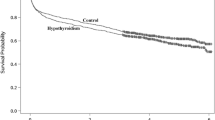Abstract
Purpose
There is scarce data about the interpretation of high thyroid hormone levels in hospitalized patients. We wished to investigate the significance of high thyroxine (T4) in hospitalized patients with low TSH.
Methods
We conducted a retrospective study of data from patients in nonsurgical departments. Three groups of random patients with low TSH were defined and compared: 123 patients with only high FT4 levels (T4 group), 82 with high FT3 levels with or without high FT4 level (T3 group), and 119 with low FT3 and FT4 level in the lower half of the norm and below (NTIS group).
Results
The primary cause of admission in the T4 and NTIS groups was infectious disease, 20.3% and 40.3%, respectively; while in the T3 group it was cardiovascular disease (31.7%). The T4 group but not T3 group had epidemiological and clinical characteristics similar to the NTIS group. The T4 group had a significant correlation between increased CRP levels and decreased FT3 (r = 0.366, p < 0.001) similar to the NTIS group. The T3 group had a borderline correlation between increased FT3 and FT4 levels (r = 0.208, p = 0.061) but the T4 group did not.
Conclusions
The combination of low TSH and high FT4 levels in hospitalized patient is usually caused by nonthyroidal illness combined with drug effects. This thyroid function disturbance is common in hospitalized patients and if the FT3 level is below the middle of the norm, treatment is probably unnecessary.
Similar content being viewed by others
Abbreviations
- T3:
-
triiodothyroxine
- T4:
-
thyroxine
- NTIS:
-
nonthyroidal illness syndrome
- CRP:
-
C reactive protein
- TSH:
-
thyroid stimulating hormone
- FT3:
-
free T3
- FT4:
-
free T4
- CVD:
-
cardiovascular disease
- COPD:
-
chronic obstructive pulmonary disease
References
L.D. Premawardhana, Thyroid testing in acutely ill patients may be an expensive distraction. Biochem. Med. 27(2), 300–307 (2017). https://doi.org/10.11613/BM.2017.033
J.R. Garber, R.H. Cobin, H. Gharib, J.V. Hennessey, I. Klein, J.I. Mechanick, R. Pessah-Pollack, P.A. Singer, K.A. Woeber, Clinical practice guidelines for hypothyroidism in adults: cosponsored by the American Association of Clinical Endocrinologists and the American Thyroid Association. Endocr. Pract. 18(6), 988–1028 (2012). https://doi.org/10.4158/EP12280.GL
J. Attia, P. Margetts, G. Guyatt, Diagnosis of thyroid disease in hospitalized patients: a systematic review. Arch. Intern. Med. 159(7), 658–665 (1999). https://doi.org/10.1001/archinte.159.7.658
D.S. Ross, H.B. Burch, D.S. Cooper, M.C. Greenlee, P. Laurberg, A.L. Maia, S.A. Rivkees, M. Samuels, J.A. Sosa, M.N. Stan, M.A. Walter, American Thyroid Association Guidelines for Diagnosis and Management of Hyperthyroidism and Other Causes of Thyrotoxicosis. Thyroid 26(10), 1343–1421 (2016). https://doi.org/10.1089/thy.2016.0229
K. Boelaert, B. Torlinska, R.L. Holder, J.A. Franklyn, Older subjects with hyperthyroidism present with a paucity of symptoms and signs: a large cross-sectional study. J. Clin. Endocrinol. Metab. 95(6), 2715–2726 (2010). https://doi.org/10.1210/jc.2009-2495
W.L. Isley, Thyroid dysfunction in the severely ill and elderly. Postgrad. Med. 94(3), 111–128 (1993). https://doi.org/10.1080/00325481.1993.11945709
M.H. Warner, G.J. Beckett, Mechanisms behind the non-thyroidal illness syndrome: an update. J. Endocrinol. 205(1), 1–13 (2010). https://doi.org/10.1677/JOE-09-0412
A. Bashkin, E. Yaakobi, M. Nodelman, O. Ronen, Is routine measurement of TSH in hospitalized patients necessary? Endocr Connect. 7(4), 567–572 (2018). https://doi.org/10.1530/EC-18-0004
P. Iglesias, A. Munoz, F. Prado, M.T. Guerrero, M.C. Macias, E. Ridruejo, P. Tajada, J.J. Diez, Alterations in thyroid function tests in aged hospitalized patients: prevalence, aetiology and clinical outcome. Clin. Endocrinol. (Oxf.) 70(6), 961–967 (2009). https://doi.org/10.1111/j.1365-2265.2008.03421.x
E. Mingote, T. Merono, R. Rujelman, A. Marquez, P. Fossati, M. Gurfinkiel, M. Schnitman, F. Brites, C. Faingold, G. Brenta, High TSH and low T4 as prognostic markers in older patients. Hormones (Athens) 11(3), 350–355 (2012). https://doi.org/10.14310/horm.2002.1364
E. Fliers, A.C. Bianco, L. Langouche, A. Boelen, Thyroid function in critically ill patients. Lancet Diabetes Endocrinol. 3(10), 816–825 (2015). https://doi.org/10.1016/S2213-8587(15)00225-9
K.M. Pantalone, C. Nasr, Approach to a low TSH level: patience is a virtue. Cleve. Clin. J. Med 77(11), 803–811 (2010). https://doi.org/10.3949/ccjm.77a.10056
G. Van den Berghe, P. Wouters, F. Weekers, S. Mohan, R.C. Baxter, J.D. Veldhuis, C.Y. Bowers, R. Bouillon, Reactivation of pituitary hormone release and metabolic improvement by infusion of growth hormone-releasing peptide and thyrotropin-releasing hormone in patients with protracted critical illness. J. Clin. Endocrinol. Metab. 84(4), 1311–1323 (1999). https://doi.org/10.1210/jcem.84.4.5636
L.J. De Groot, Non-thyroidal illness syndrome is a manifestation of hypothalamic-pituitary dysfunction, and in view of current evidence, should be treated with appropriate replacement therapies. Crit. Care Clin. 22(1), 57–86 (2006). https://doi.org/10.1016/j.ccc.2005.10.001
C. Spencer, A. Eigen, D. Shen, M. Duda, S. Qualls, S. Weiss, J. Nicoloff, Specificity of sensitive assays of thyrotropin (TSH) used to screen for thyroid disease in hospitalized patients. Clin. Chem. 33(8), 1391–1396 (1987).
J. Rosenfarb, N. Sforza, R. Rujelman, Y. Morosan Allo, C. Parisi, E. Blanc, C. Frigerio, P. Fossati, D. Caruso, C. Faingold, T. Merono, G. Brenta, Relevance of TSH evaluation in elderly in-patients with non-thyroidal illness. J. Endocrinol. Invest 42(6), 667–671 (2019). https://doi.org/10.1007/s40618-018-0967-0
H.E. Ataoğlu, S. Ahbab, M.K. Serez, M. Yamak, D. Kayaş, E.T. Canbaz, F. Çetin, Ş. Seçmeler, F. Şar, M. Yenigün, Prognostic significance of high free T4 and low free T3 levels in non-thyroidal illness syndrome. Eur. J. Intern. Med 57, 91–95 (2018). https://doi.org/10.1016/j.ejim.2018.07.018
A. Merke, J. Merke, G. Silbernagel, W. März, Free Thyroid Hormones and Mortality in Caucasians Undergoing Angiography: The Ludwigshafen Risk and Cardiovascular Health (Luric) Study. Endocr. Pract. 23(3), 288–298 (2017). https://doi.org/10.4158/EP161217.OR
Acknowledgements
The authors wish to thank Ms. Tobie Kuritsky and Mrs. Anita Glick for editorial assistance.
Author information
Authors and Affiliations
Corresponding author
Ethics declarations
Conflict of interest
The authors declare that they have no conflict of interest.
Ethical approval
The study was approved by the Institutional Review Board.
Informed consent
Informed consent was waived.
Additional information
Publisher’s note Springer Nature remains neutral with regard to jurisdictional claims in published maps and institutional affiliations.
Rights and permissions
About this article
Cite this article
Bashkin, A., Abu Ali, J., Shehadeh, M. et al. The significance of high thyroxine in hospitalized patients with low thyroid-stimulating hormone. Endocrine 72, 445–451 (2021). https://doi.org/10.1007/s12020-020-02463-6
Received:
Accepted:
Published:
Issue Date:
DOI: https://doi.org/10.1007/s12020-020-02463-6




